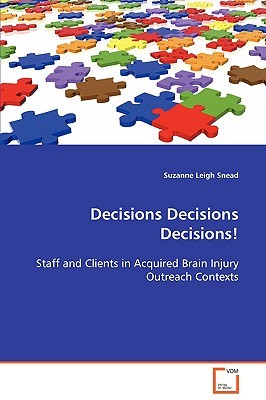
- We will send in 10–14 business days.
- Author: Suzanne Leigh Snead
- Publisher: VDM Verlag
- ISBN-10: 3639081315
- ISBN-13: 9783639081312
- Format: 15.2 x 22.9 x 1.5 cm, minkšti viršeliai
- Language: English
- SAVE -10% with code: EXTRA
Decisions Decisions Decisions! Staff and Clients in Acquired Brain Injury Outreach Contexts (e-book) (used book) | bookbook.eu
Reviews
Description
Staff who work in front line, direct contact support positions with community based clients with acquired brain injuries (ABI) hold unique responsibilities, and face unique challenges in their work due to the combination of three key factors: autonomous work environments, socially sanctioned power status over clients, and the decision making deficits of clients with ABI. These factors further contribute challenges to staff in the presently complex and ambiguous outreach context, where the embedded ideologies of the medical model of treatment remain in tension with the purported ideologies of the social model of disability and client self determination that drive outreach services. This work documents decision making strategies used by interview participants, examines the factors that influence their decision space when in the field with clients, and explores the role staff awareness of professional and personal values plays in making decisions in the best of interest of the client. Staff awareness is shown to be a critical, yet oft neglected factor in consideration of staff ethical decision making in ABI outreach. Implications for best practices in the field are discussed.
EXTRA 10 % discount with code: EXTRA
The promotion ends in 21d.20:01:19
The discount code is valid when purchasing from 10 €. Discounts do not stack.
- Author: Suzanne Leigh Snead
- Publisher: VDM Verlag
- ISBN-10: 3639081315
- ISBN-13: 9783639081312
- Format: 15.2 x 22.9 x 1.5 cm, minkšti viršeliai
- Language: English English
Staff who work in front line, direct contact support positions with community based clients with acquired brain injuries (ABI) hold unique responsibilities, and face unique challenges in their work due to the combination of three key factors: autonomous work environments, socially sanctioned power status over clients, and the decision making deficits of clients with ABI. These factors further contribute challenges to staff in the presently complex and ambiguous outreach context, where the embedded ideologies of the medical model of treatment remain in tension with the purported ideologies of the social model of disability and client self determination that drive outreach services. This work documents decision making strategies used by interview participants, examines the factors that influence their decision space when in the field with clients, and explores the role staff awareness of professional and personal values plays in making decisions in the best of interest of the client. Staff awareness is shown to be a critical, yet oft neglected factor in consideration of staff ethical decision making in ABI outreach. Implications for best practices in the field are discussed.


Reviews